DNA damage (red) in the spleen of a mouse that expresses the mutant form of CDK1 that cannot be suppressed by phosphorylation. Credit: A*STAR Institute of Molecular and Cell Biology
A protein crucial for cell division may help to explain why certain cancer therapies are more effective in some patients than others. Genetically altered regulation of this protein has helped A*STAR researchers better understand the mechanisms underpinning new cancer therapies that target the same regulatory process.
Cyclin-dependent kinase 1 (CDK1) is necessary for cell division; its absence causes death during embryonic development. However, elevated CDK1 activity is a feature of all cancers, and drives the cell proliferation required for tumor growth. Consequently, CDK1 activity is tightly regulated in vivo.
One aspect of this regulation involves suppression of CDK1 activity to prevent initiation of division in the wrong stage of the cell cycle. Several checkpoints during the cell cycle trigger downstream pathways that lead to phosphorylation at two sites on CDK1. This phosphorylation is the target of new cancer therapies, called WEE1 inhibitors, currently being tested in clinical trials.
"The process of CDK1 suppression has been studied extensively in yeast and mammalian cells, but not in animals," explains Philipp Kaldis from the A*STAR Institute of Molecular and Cell Biology, who was the senior investigator in the new work. "Our aim was to study what happens in vivo when the checkpoints are abrogated, and to compare our genetic model with the effects of WEE1 inhibitors."
The researchers made mice that expressed a mutant form of CDK1 that cannot be phosphorylated at the two key sites. The mutant CDK1 was lethal in early embryos, and further experiments demonstrated that its expression led to substantial DNA damage and initiation of cell division at the wrong time.
Comparison of the effects of mutant CDK1 with those of WEE1 inhibitors showed that, although both approaches target the same regulatory pathway, their mechanisms of action differ. Specifically, the effects of WEE1 inhibitors, unlike those of mutant CDK1, depend on expression levels of p53, a tumor suppressor gene that is central to mechanisms of cancer. Without functional activity of p53, activity of CDK1 is even higher, and the benefits of WEE1 inhibitors are greater.
"Our findings explain mechanistically why WEE1 inhibitors work better in cancer cells that bear mutations or deletions in the p53 gene," says Kaldis. "This is important because p53 is mutated in approximately 50 per cent of all cancers."
Kaldis says the next step is to use this information to inform cancer treatment choices. "Our work suggests that WEE1 inhibitors should be preferentially given to patients with tumors that bear p53 mutations or deletions," he concludes.
More information: Radoslaw Szmyd et al. Premature activation of Cdk1 leads to mitotic events in S phase and embryonic lethality, Oncogene (2018). DOI: 10.1038/s41388-018-0464-0
Journal information: Oncogene























